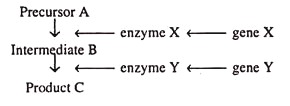The following points highlight the top four examples to substantiate the practical implacability of microbial mutants.
1. Induced mutants have been used extensively in the investigation of various biochemical processes, particularly metabolic reactions. Metabolic processes occur via sequences of enzyme-catalyzed reactions and by developing mutants in which the genes coding for enzymes are mutated (altered), the sequence of steps in a pathway can often be determined.
Consider, for example, the following simple pathway:
Intermediate B is produced from precursor A by the action of enzyme X, the product of gene X. Intermediate B, however, may rapidly be converted to product C by enzyme Y, the product of gene Y. If so, intermediate B may be present in very low quantities and be very difficult to identify biochemically.
However, in a mutant that has a mutation in gene Y resulting in the synthesis of either an inactive form of enzyme Y or no enzyme Y, intermediate B will often accumulate to much higher concentration facilitating its isolation and identification.
2. Induced mutants of microbes are used in producing large yields of many end-products important in various industries. For example, when penicillin was first discovered the yield was low and production was seriously limited. Then millions of spores were irradiated and mutants of Penicillium were selected. Such mutants dramatically increased the yield of penicillin in commercial production and proven invaluable for antibiotic industry.
3. Some microorganisms are known to develop resistance against certain antibiotics because of mutation. This fact is of great significance in the treatment of diseases because the antibiotics are originally effective for the control of a bacterial infection but they become less effective or ineffective as the antibiotic resistant mutants develop.
4. The maintenance of pure cultures of typical microbial species requires that occurrence of mutations be prevented. Otherwise, the cultures will no longer remain pure.
